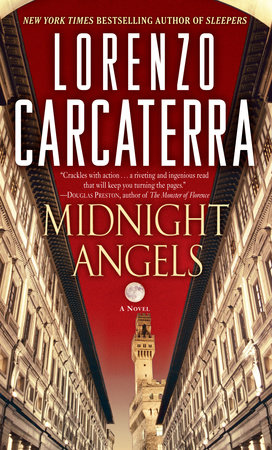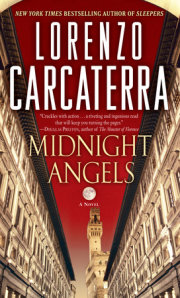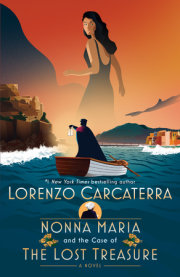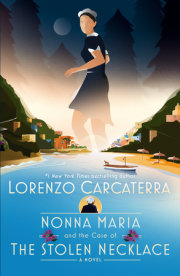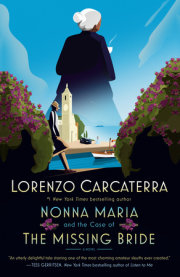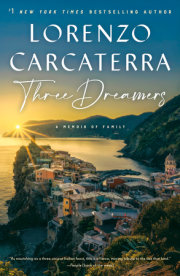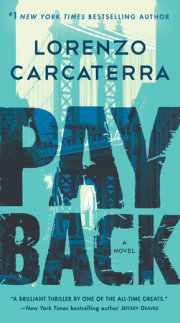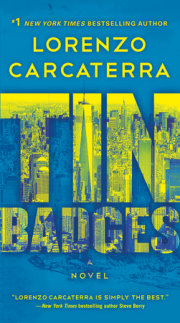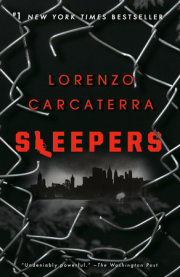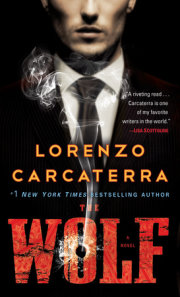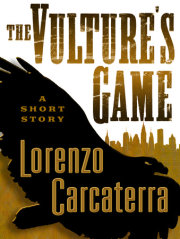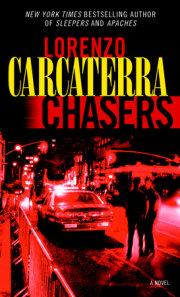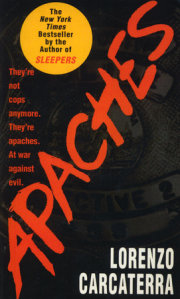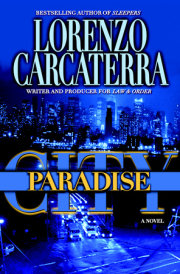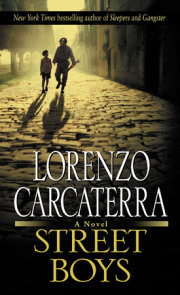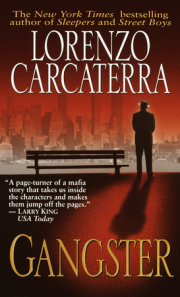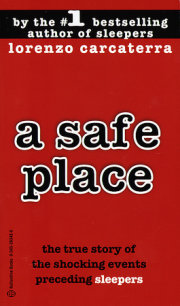Chapter One
Summer 2010
FLORENCE, ITALYKate and marco made a sharp left onto chiasso altoviti, leaving the rushing waters of the Arno behind them, running at full speed across the cobblestones of the narrow street. Kate, her long brown hair held together by a blue butterfly clip, led the way as they dodged the occasional shopper, bumped against a parked Vespa, and successfully evaded an elderly woman hauling two plastic bags filled with fruits and vegetables.
“They are no longer chasing us, I think,” Marco said, grinding to a fast stop. His English was accented, his light brown polo shirt marked with sweat as he rested his hands on the knees of a pair of Levi knockoffs. He was in his late twenties, thick dark hair flowing toward the nape of his neck, his strong features highlighted by rich olive eyes.
Kate slowed her pace and turned to gaze down the curved street. “Let’s keep moving,” she said, “just in case.”
“Just in case what?” Marco asked.
Two men, dressed in track suits and sneakers, came tearing around the Borgo Apostoli. “In case you’re wrong,” she said as she grabbed his arm and sprinted down the street.
“I told you we shouldn’t have done what we did,” Marco said, as short of breath as he was filled with anger. “I told you we should have left things the way they were.”
“No, you didn’t,” Kate said, not slowing down as she turned her head to check on the men. “You never told me any of that.”
“And what good would it have done if I had?” he asked.
The men were closing in, moving through the early morning shoppers and tourists at a faster clip, more experienced in the art of pursuit than their targets were in the art of fleeing.
Kate and Marco made a full-charge run toward the Uffizi. “If we can make it in there, we might have a chance to lose them,” she said, pointing toward the imposing gallery. “A guide who works there is a friend of mine. She’ll find us a place to hide.”
“Are you sure she’s working today?” Marco asked.
“It’s a guess,” Kate said. “But right now, a guess is the best I can do.”
“We should be in a café, drinking espresso, listening to Bob Dylan,” Marco said. “Instead, we are running from two men who maybe want to kill us.”
“I didn’t know you liked Dylan,” she said, turning onto Via de’ Georgofili, closing in on the Uffizi. She wiped a strand of brown hair from her face, gave a quick glance at her pursuers and a nod of encouragement to Marco.
They both stopped when they saw the rope ladder hanging from an open double window three stories above them, a middle-aged man waving frantically for them to begin their climb. “Fai presto,” he shouted down. “Please, hurry. There is not much time. You have only seconds.”
“How do we know to trust him?” Marco asked, reaching for the bottom rung of the rope, noticing the two men turning a corner and heading their way. “How do we know he’s not with them?”
“We don’t,” Kate said, holding the rope for support and nodding for Marco to begin his climb.
In seconds he was halfway up the ladder with Kate right behind him, lifting the rungs as she moved forward, leaving the two men at street level staring at them in frustration. They banged against the thick red oak door that led into the building’s entrance but were met by a series of dead bolts and unanswered buzzers. Marco looked up at the middle-aged man who was leaning outside his window ready to greet him with a smile and an open hand. “Bravo, ragazzo,” the man said as he helped ease Marco inside his apartment. “Now the signorina, no?”
“I’ll help her in,” Marco said, reaching down and offering both hands to Kate as she kicked clear of the ladder and stepped onto the window ledge and into the room.
“Now you must go quickly up to the roof,” the man said. “In Florence, walking across the rooftops is the fastest way to get anywhere, better even than any bus or taxi.”
“Why are you helping us?” Kate asked, looking into the man’s eyes. He was short and overweight but carried it well, dressed in dark tailored slacks and starched white shirt, sleeves rolled up to the elbows.
“It looked to me as if someone should,” the man said, his English as confident as his manner. “And I’ve never been one to stay out of other people’s affairs. I take after my mother in that way, I suppose.”
“The two following us might find you,” Marco said, standing with his back to a large wooden hutch filled with old photos and memorabilia. “Not that I know them personally, but my guess is that they aren’t the type who show much patience with anyone getting in their way.”
“Make them my worry, then,” the man said. “You concern yourself with getting up to the roof and finding your way to safety.”
“What’s your name?” Kate asked.
“Gian Lucca,” he said with a slight bow of his head. “I was named after my grandfather, as most Italian boys seem to be.”
Kate smiled at Gian Lucca, then leaned over and hugged him. “Thank you,” she said. “What you’re doing is very kind and very brave.”
“And very foolish,” Marco said. He caught the sideways glances of both Kate and Gian Lucca. “Not that I don’t appreciate it,” he said.
Gian Lucca turned away from Marco, looked across at Kate and let free a warm smile. “Please,” he said, “I must get you to the roof. While I hate to agree with him, your young friend is correct. Those men will be here soon, and they will not be as happy to see me as you both were. Time is not a friend to us.”
A few moments later Kate and Marco stood on the rooftop of the small building, the sun glistening off the Arno a short distance away, the grandeur of the Uffizi at their backs.
“The leaps from roof to roof are short and should not pose much risk,” Gian Lucca said. “You need to reach the building closest to the Ponte Vecchio. The top door will be unlocked. Once you make your way out to the street, cross to the other side of the Arno and you will be safe, at least for now.”
“What about you?”
“I need to prepare,” Gian Lucca said. “I have guests arriving.”
“You don’t need to risk your life,” Kate said, holding his right hand in hers. “We can stay and help.”
“Better still,” Marco said, “you can leave with us. Why get into a fight when it is so easy to avoid them? A lesson clearly not yet learned by my American friend.”
“Your concern is appreciated,” Gian Lucca said, smiling and patting his stomach. “But for me, jumping across rooftops is not the safest option.”
“Will we see you again?” Kate asked.
“Only if you plan on being chased again,” Gian Lucca said.
“Then I imagine we’ll all be close friends,” Marco said. “I’ve only known her ten days and already I’ve sweated through every shirt I own.”
Gian Lucca heard footsteps coming up the stairwell, opened the thick black door of the roof and gazed down. “I must go and greet my guests,” he said. He waved at Kate and Marco and walked back into the building, closing the door to the rooftop and locking it from the inside.
“How many rooftops have you jumped across in your life?” Marco asked Kate.
“Half a dozen or so,” she said, “maybe more. I had a friend in high school who was very good at it, and I would go with her sometimes.”
“I didn’t have friends like that,” he said. “Going skiing was probably the wildest activity we ever did.”
“How good a skier are you?”
“One broken arm and one broken leg in three trips,” he said. “What does that tell you?”
“It tells me I should jump first,” Kate said.
And she did.
Copyright © 2010 by Lorenzo Carcaterra. All rights reserved. No part of this excerpt may be reproduced or reprinted without permission in writing from the publisher.

